2024届高三英语二轮词法复习之形容词副词课件(16张PPT)
文档属性
| 名称 | 2024届高三英语二轮词法复习之形容词副词课件(16张PPT) |  | |
| 格式 | pptx | ||
| 文件大小 | 4.5MB | ||
| 资源类型 | 教案 | ||
| 版本资源 | 通用版 | ||
| 科目 | 英语 | ||
| 更新时间 | 2023-07-24 17:25:15 | ||
图片预览

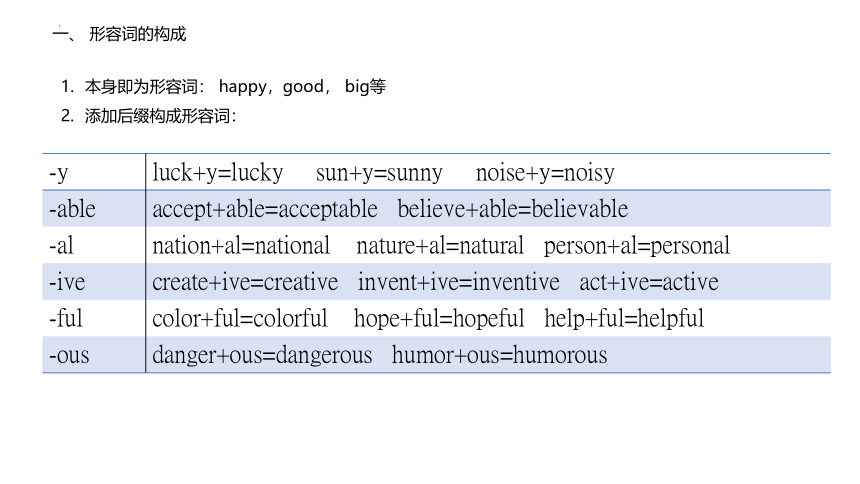
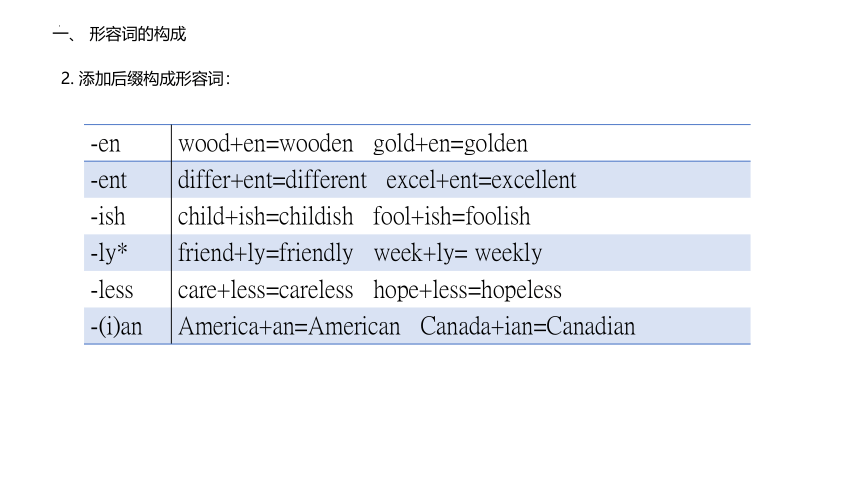
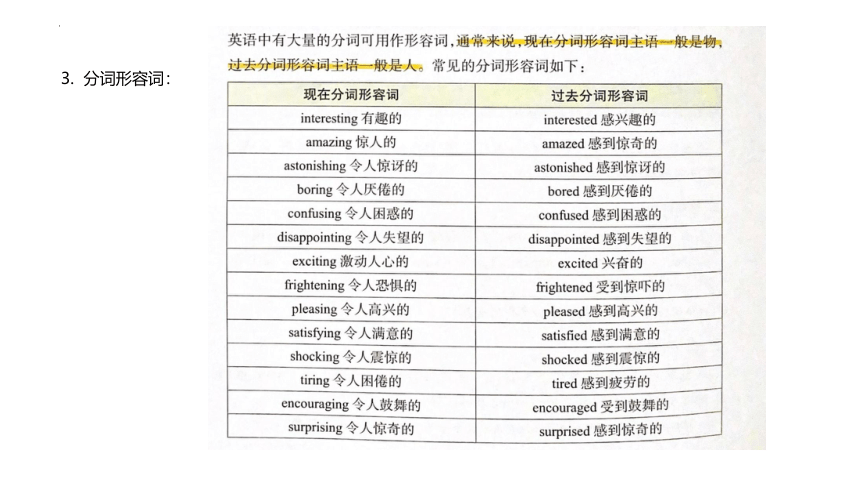
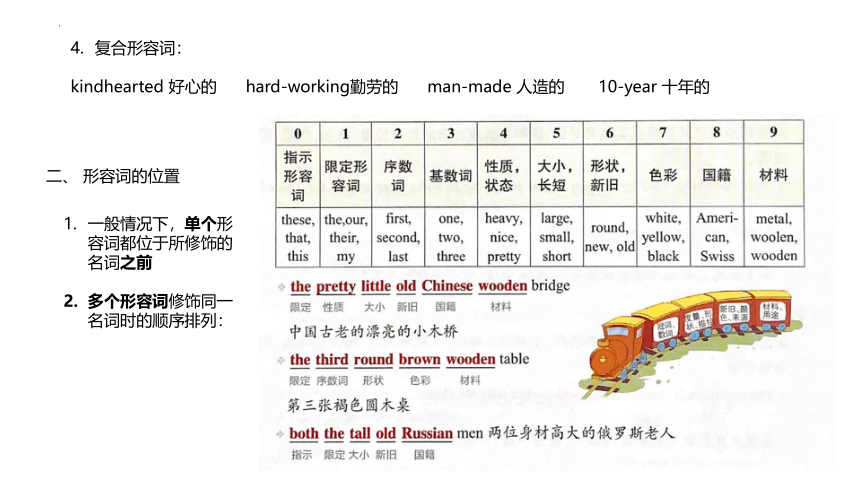
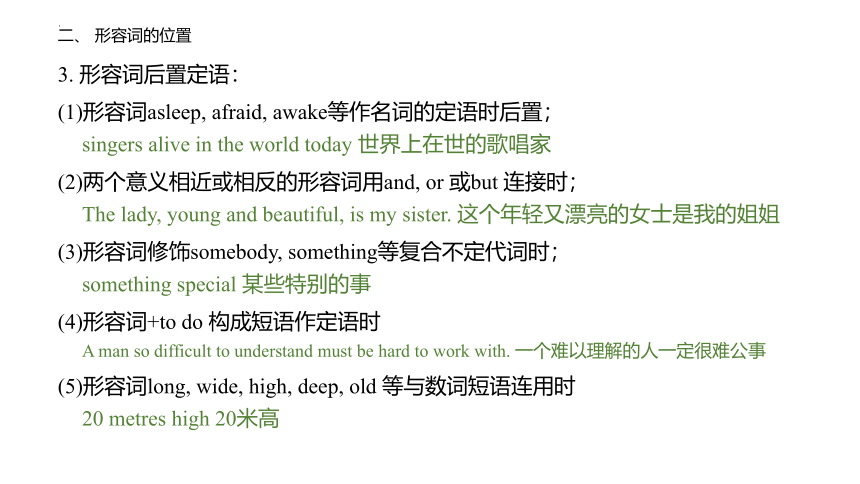
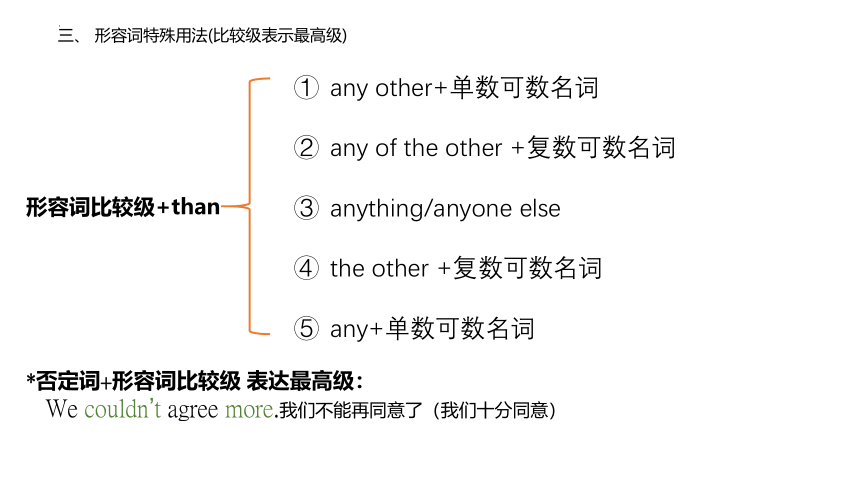
文档简介
(共16张PPT)
形容词复习专题
一、 形容词的构成
本身即为形容词: happy,good, big等
添加后缀构成形容词:
-y luck+y=lucky sun+y=sunny noise+y=noisy
-able accept+able=acceptable believe+able=believable
-al nation+al=national nature+al=natural person+al=personal
-ive create+ive=creative invent+ive=inventive act+ive=active
-ful color+ful=colorful hope+ful=hopeful help+ful=helpful
-ous danger+ous=dangerous humor+ous=humorous
一、 形容词的构成
2. 添加后缀构成形容词:
-en wood+en=wooden gold+en=golden
-ent differ+ent=different excel+ent=excellent
-ish child+ish=childish fool+ish=foolish
-ly* friend+ly=friendly week+ly= weekly
-less care+less=careless hope+less=hopeless
-(i)an America+an=American Canada+ian=Canadian
3. 分词形容词:
复合形容词:
kindhearted 好心的 hard-working勤劳的 man-made 人造的 10-year 十年的
二、 形容词的位置
一般情况下,单个形容词都位于所修饰的名词之前
多个形容词修饰同一名词时的顺序排列:
二、 形容词的位置
3. 形容词后置定语:
形容词asleep, afraid, awake等作名词的定语时后置; singers alive in the world today 世界上在世的歌唱家
两个意义相近或相反的形容词用and, or 或but 连接时; The lady, young and beautiful, is my sister. 这个年轻又漂亮的女士是我的姐姐
形容词修饰somebody, something等复合不定代词时; something special 某些特别的事
形容词+to do 构成短语作定语时 A man so difficult to understand must be hard to work with. 一个难以理解的人一定很难公事
形容词long, wide, high, deep, old 等与数词短语连用时 20 metres high 20米高
三、 形容词特殊用法(比较级表示最高级)
形容词比较级+than
any other+单数可数名词
any of the other +复数可数名词
anything/anyone else
the other +复数可数名词
any+单数可数名词
*否定词+形容词比较级 表达最高级:
We couldn’t agree more.我们不能再同意了(我们十分同意)
C. yellow
E. Salted duck eggs
口诀:美小圆旧黄, 法国木书房
G. cute
H. small
A. round
B. Chinese
F. moon cake
D. a
C. yellow
E. Salted duck eggs
口诀:美小圆旧黄, 法国木书房
G. cute
H. small
A. round
B. Chinese
F. moon cake
D. a
副词复习专题
一、 副词的构成
本身即为副词: quite, there, before等
借助后缀构成副词:
+ly final+ly=finally active+ly=actively
y→i +ly noisy+ly=noisily merry+ly=merrily easy+ly=easily
le→l +y gentle+y=gently simple+y=simply
e结尾+ly mere+ly=merely positive+ly=positively
ic结尾+ally basic+ally=basically tragic+ally=tragically
ll结尾+y full+y=fully dull+y=dully
3. 借助ward(s)构成副词: towards(向,朝), southwards(朝南)等
1. (2017.3月) John belongs to that club, whose members meet _____ to discuss social issues and share ideas and thoughts.
A. regularly B. originally C. gradually D. immediately
注意:副词考察,理解句意和分析前后文的逻辑关系是关键。
二、 副词的分类及位置
类型 举例 句中的位置
时间副词 yesterday, today, tomorrow, soon, lately, then, before 一般位于句尾, 强调时位于句首
地点副词 outside, nearby, upstairs, underground, westward 一般位于句尾, 偶尔放句首
方式副词 quickly, politely, angrily, suddenly, loudly, simply 一般位于句尾, 宾语过长时提前
程度副词 quite, very, almost, hardly, enough, too, completely Be动词情态动词之后;形容词副词之前
疑问副词 when, where, how, why 提问时用于句首
关系副词 when, where, why 引导定语从句时通常置于先行词之后
频度副词 never, seldom, sometimes, often, usually, always, ever 实义动词之前;Be动词情态动词之后
连接副词 therefore, however, instead, moreover, besides, then 句首或句尾,句中作插入语
评论副词 actually, honestly, generally, probably, perhaps, anyway, luckily 句首或句中
2. He never complains about the difficulties he has in life. ______, he always has ways to overcome them.
A. However B. Therefore C. Instead D. Otherwise
注意:副词考察,理解句意和分析前后文的逻辑关系是关键。
三、 副词特殊用法(比较级表示最高级)
副词比较级+than
any other+单数可数名词
the other +复数可数名词
anything/anyone else
any of the other +复数可数名词
虽然外形像副词但实际是形容词的有:
lively 生动活泼的 lonely 孤独的,孤僻的 lovely 可爱的
deadly 致命的 friendly 友好的 ugly 丑陋的
silly 愚蠢的 likely 可能的 brotherly 兄弟般的
daily 日常的 weekly 每周的 monthly 每月的
形容词副词同形的有:但意义不同
fair tight well
short past right
early late near
close fast hard
adj. 公平的 ;相当好的;浅色的
adv.公平地;非常;正面地
adj. 短(暂)的 ;稀少的
adv.达不到标准;使变短地
adj.早的;早期的;
adv.提早;提前;不久;很快地;
3. It was raining heavily. Little Mary felt cold, so she stood ______to her mother.
A. close B. closely C. closed D. closing
注意:形容词用来形容名词或名词短语,副词用来修饰形容词、副词或动词。
adj.近的;;关系近的;关闭的;
adv. 在近处;接近地;紧紧地;
adj.狭窄的; 紧的;抠门的
adv.紧紧地;牢牢地;死死地
adj.先前的;过去的;以往的; adv.经过;通过;以前;
adj.(时间)晚的;最近的;已故的
adv.晚地; 迟地;较晚;最近
adj.快的;迅速(完成)的
adv.快速地;快速不断地
adj.健康的;没病的;很好的;
adv.好地;成功地;相当
adj.正确的;右边的;正的;
adv.正确地;准确地; 恰好地;
adj.近的;在附近的;
adv.靠近;在附近;差一点儿;几乎
adj.艰难的;坚硬的;辛苦的;
adv.努力地;艰苦地;用力地
形容词、副词解题思路(不仅限于单选):
依靠语境,大胆猜测——知句意
遇词不会,合理推测——找词根
找准提示,关键预测——猜过程/结局
Exercise : 用形容词或副词填空。
1. The driver of the car had ________ injuries(n.伤). (serious/seriously)
2. I think you behaved very _________. (selfish/ selfishly)
3. Rose is _______ upset about losing her job. (terrible/terribly)
4. Don‘t go up that ladder(n.梯子). It doesn't look _______. (safe/safely)
5. Everybody at the party was ___________ dressed. (colorful/colorfully)
6. She fell and hurt herself quite _________ . (bad/badly)
serious
selfishly
terribly
safe
colorfully
badly
形容词复习专题
一、 形容词的构成
本身即为形容词: happy,good, big等
添加后缀构成形容词:
-y luck+y=lucky sun+y=sunny noise+y=noisy
-able accept+able=acceptable believe+able=believable
-al nation+al=national nature+al=natural person+al=personal
-ive create+ive=creative invent+ive=inventive act+ive=active
-ful color+ful=colorful hope+ful=hopeful help+ful=helpful
-ous danger+ous=dangerous humor+ous=humorous
一、 形容词的构成
2. 添加后缀构成形容词:
-en wood+en=wooden gold+en=golden
-ent differ+ent=different excel+ent=excellent
-ish child+ish=childish fool+ish=foolish
-ly* friend+ly=friendly week+ly= weekly
-less care+less=careless hope+less=hopeless
-(i)an America+an=American Canada+ian=Canadian
3. 分词形容词:
复合形容词:
kindhearted 好心的 hard-working勤劳的 man-made 人造的 10-year 十年的
二、 形容词的位置
一般情况下,单个形容词都位于所修饰的名词之前
多个形容词修饰同一名词时的顺序排列:
二、 形容词的位置
3. 形容词后置定语:
形容词asleep, afraid, awake等作名词的定语时后置; singers alive in the world today 世界上在世的歌唱家
两个意义相近或相反的形容词用and, or 或but 连接时; The lady, young and beautiful, is my sister. 这个年轻又漂亮的女士是我的姐姐
形容词修饰somebody, something等复合不定代词时; something special 某些特别的事
形容词+to do 构成短语作定语时 A man so difficult to understand must be hard to work with. 一个难以理解的人一定很难公事
形容词long, wide, high, deep, old 等与数词短语连用时 20 metres high 20米高
三、 形容词特殊用法(比较级表示最高级)
形容词比较级+than
any other+单数可数名词
any of the other +复数可数名词
anything/anyone else
the other +复数可数名词
any+单数可数名词
*否定词+形容词比较级 表达最高级:
We couldn’t agree more.我们不能再同意了(我们十分同意)
C. yellow
E. Salted duck eggs
口诀:美小圆旧黄, 法国木书房
G. cute
H. small
A. round
B. Chinese
F. moon cake
D. a
C. yellow
E. Salted duck eggs
口诀:美小圆旧黄, 法国木书房
G. cute
H. small
A. round
B. Chinese
F. moon cake
D. a
副词复习专题
一、 副词的构成
本身即为副词: quite, there, before等
借助后缀构成副词:
+ly final+ly=finally active+ly=actively
y→i +ly noisy+ly=noisily merry+ly=merrily easy+ly=easily
le→l +y gentle+y=gently simple+y=simply
e结尾+ly mere+ly=merely positive+ly=positively
ic结尾+ally basic+ally=basically tragic+ally=tragically
ll结尾+y full+y=fully dull+y=dully
3. 借助ward(s)构成副词: towards(向,朝), southwards(朝南)等
1. (2017.3月) John belongs to that club, whose members meet _____ to discuss social issues and share ideas and thoughts.
A. regularly B. originally C. gradually D. immediately
注意:副词考察,理解句意和分析前后文的逻辑关系是关键。
二、 副词的分类及位置
类型 举例 句中的位置
时间副词 yesterday, today, tomorrow, soon, lately, then, before 一般位于句尾, 强调时位于句首
地点副词 outside, nearby, upstairs, underground, westward 一般位于句尾, 偶尔放句首
方式副词 quickly, politely, angrily, suddenly, loudly, simply 一般位于句尾, 宾语过长时提前
程度副词 quite, very, almost, hardly, enough, too, completely Be动词情态动词之后;形容词副词之前
疑问副词 when, where, how, why 提问时用于句首
关系副词 when, where, why 引导定语从句时通常置于先行词之后
频度副词 never, seldom, sometimes, often, usually, always, ever 实义动词之前;Be动词情态动词之后
连接副词 therefore, however, instead, moreover, besides, then 句首或句尾,句中作插入语
评论副词 actually, honestly, generally, probably, perhaps, anyway, luckily 句首或句中
2. He never complains about the difficulties he has in life. ______, he always has ways to overcome them.
A. However B. Therefore C. Instead D. Otherwise
注意:副词考察,理解句意和分析前后文的逻辑关系是关键。
三、 副词特殊用法(比较级表示最高级)
副词比较级+than
any other+单数可数名词
the other +复数可数名词
anything/anyone else
any of the other +复数可数名词
虽然外形像副词但实际是形容词的有:
lively 生动活泼的 lonely 孤独的,孤僻的 lovely 可爱的
deadly 致命的 friendly 友好的 ugly 丑陋的
silly 愚蠢的 likely 可能的 brotherly 兄弟般的
daily 日常的 weekly 每周的 monthly 每月的
形容词副词同形的有:但意义不同
fair tight well
short past right
early late near
close fast hard
adj. 公平的 ;相当好的;浅色的
adv.公平地;非常;正面地
adj. 短(暂)的 ;稀少的
adv.达不到标准;使变短地
adj.早的;早期的;
adv.提早;提前;不久;很快地;
3. It was raining heavily. Little Mary felt cold, so she stood ______to her mother.
A. close B. closely C. closed D. closing
注意:形容词用来形容名词或名词短语,副词用来修饰形容词、副词或动词。
adj.近的;;关系近的;关闭的;
adv. 在近处;接近地;紧紧地;
adj.狭窄的; 紧的;抠门的
adv.紧紧地;牢牢地;死死地
adj.先前的;过去的;以往的; adv.经过;通过;以前;
adj.(时间)晚的;最近的;已故的
adv.晚地; 迟地;较晚;最近
adj.快的;迅速(完成)的
adv.快速地;快速不断地
adj.健康的;没病的;很好的;
adv.好地;成功地;相当
adj.正确的;右边的;正的;
adv.正确地;准确地; 恰好地;
adj.近的;在附近的;
adv.靠近;在附近;差一点儿;几乎
adj.艰难的;坚硬的;辛苦的;
adv.努力地;艰苦地;用力地
形容词、副词解题思路(不仅限于单选):
依靠语境,大胆猜测——知句意
遇词不会,合理推测——找词根
找准提示,关键预测——猜过程/结局
Exercise : 用形容词或副词填空。
1. The driver of the car had ________ injuries(n.伤). (serious/seriously)
2. I think you behaved very _________. (selfish/ selfishly)
3. Rose is _______ upset about losing her job. (terrible/terribly)
4. Don‘t go up that ladder(n.梯子). It doesn't look _______. (safe/safely)
5. Everybody at the party was ___________ dressed. (colorful/colorfully)
6. She fell and hurt herself quite _________ . (bad/badly)
serious
selfishly
terribly
safe
colorfully
badly
